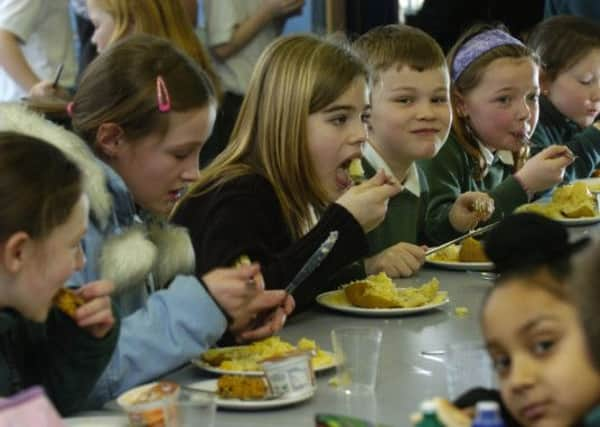Commit to free meals for primary schools - union


The Educational Institute of Scotland (EIS), which represents 80 per cent of the country’s teachers, called on the Scottish Government to commit to free meals for pupils in primaries one to three after a similar pledge by the UK government for schools in England.
The EIS said providing free school meals was one of the best ways of improving the health and wellbeing of those from disadvantaged backgrounds, as well as reducing the attainment gap with those from affluent homes.
Advertisement
Hide AdAdvertisement
Hide AdLarry Flanagan, EIS general secretary, said: “Ensuring that all pupils in P1 to P3 receive free school meals would be a significant step, which would aid family budgets, bring important health benefits for young children and help these pupils concentrate on their learning throughout the school day.
“We call on the Scottish Government to make a firm commitment to deliver this free meal pledge.”
Last week a coalition including children’s charities and the Church of Scotland wrote to First Minister Alex Salmond saying free healthy school lunches would give “a well evidenced, direct and immediate boost to the wellbeing of children and families across Scotland”.
Chancellor George Osborne used his Autumn Statement to confirm free school lunches for all children in the first three years of school in England from next September. The pledge will cost around £600 million and will see more funding allocated to Scotland as Barnett consequentials – the formula which decides how much Treasury money comes north.
Launching a new campaign to highlight the impact of child poverty, the EIS said the money should be used to fulfil the pledge of free schools meals first made by the SNP in 2007.
“The EIS has a long-standing commitment to support measures aimed at tackling child poverty and providing all young people with the opportunity to reach their potential,” Mr Flanagan added.
“The new EIS campaign will highlight poverty and inequality issues, specifically in relation to the impact on learning and teaching in Scottish education establishments and young people’s health and wellbeing. We will also work to identify and publicise strategies that can be used to counteract the disadvantaging effects of poverty, both in terms of educational experience and the health and wellbeing of pupils.”
A universal approach to free school meals in P1 to P3 was announced by the Scottish Government in 2007 and reaffirmed in 2010 following successful pilots across five Scottish local authorities. Councils were later given flexibility on how they rolled out the commitment but no local authority has yet implemented the policy in full. Free school meals are currently available in Scotland to those whose parents are receiving benefits.
Advertisement
Hide AdAdvertisement
Hide AdLast week, figures from the Scottish Government showed a strong link between exam results and the proportion of the school roll receiving free lunches, a reliable indicators of deprivation. The schools with the best results had lower numbers of children receiving free meals.
A Scottish Government spokeswoman said: “The number of eligible children registered for free school meals has increased by 19,000 since 2007. We are committed to expanding free school meal provision further but have been focusing on maintaining eligibility to free school meals under the UK government’s programme for welfare reform. Recently we were informed of the Barnett consequential arising from the UK government’s statement. As the funding will form part of the Scottish Block Grant as a whole, we are giving careful consideration to how money may be used to the optimum benefit for children and young people.
“We fully recognise the importance of tackling poverty, including child poverty. The Scottish Government is taking a long-term approach through our Child Poverty Strategy for Scotland.”